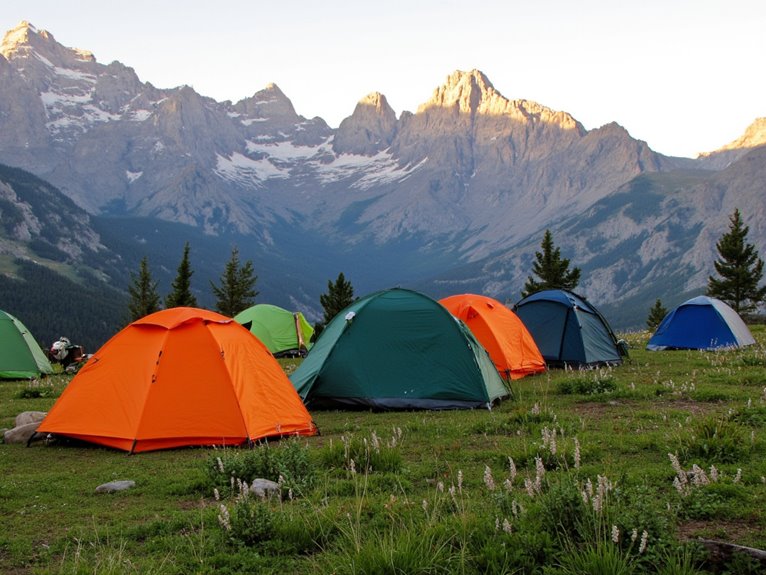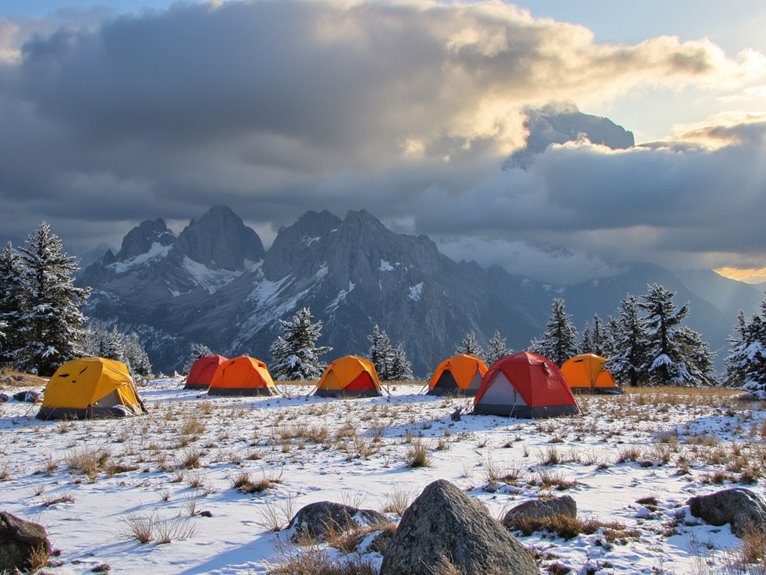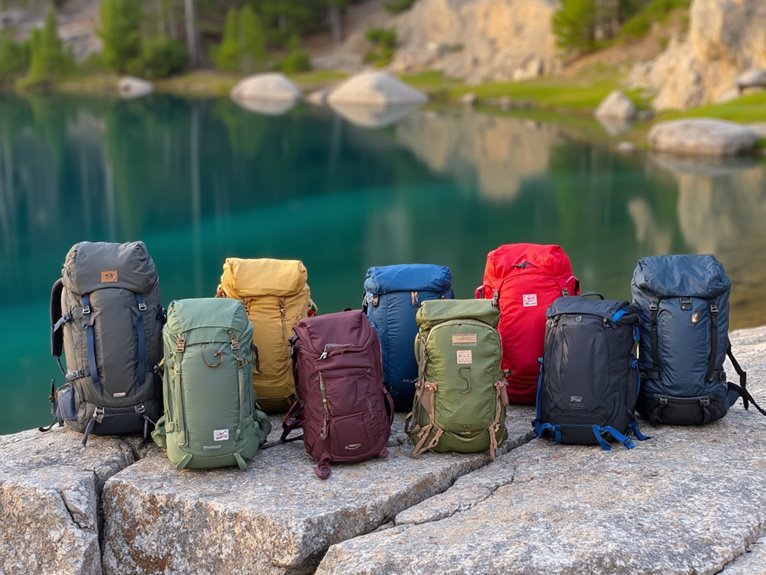What Is the Best Food to Eat While Hiking?
When venturing out on a hike, fueling your body with the right foods is vital for maintaining energy levels, supporting overall health, and guaranteeing a safe and enjoyable journey. Focus on whole, unprocessed foods like fruits, vegetables, whole grains, lean meats, and nuts to achieve peak nutrition. Fresh fruits and nuts offer a perfect combination of natural sugars, fiber, and healthy fats to fuel hikes. Dried fruits, nuts, and seeds make excellent energy-boosting snacks, providing a natural source of carbohydrates, protein, and healthy fats. To maximize your hiking experience, discover how to make informed food choices that support your body's needs.
We are supported by our audience. When you purchase through links on our site, we may earn an affiliate commission, at no extra cost for you. Learn more. Last update on 29th January 2026 / Images from Amazon Product Advertising API.
Fueling for the Trail Ahead
Proper nutrition is essential for a successful and enjoyable hiking experience, as it directly impacts energy levels, endurance, and overall performance on the trail.
A well-planned diet provides the necessary fuel for sustained energy and prevents fatigue, cramping, and other performance-related issues.
Complex carbohydrates, lean proteins, and healthy fats are essential for maintaining energy levels and supporting overall health.
Aim to consume a balanced mix of these macronutrients in the days leading up to your hike. Focus on whole, unprocessed foods like fruits, vegetables, whole grains, lean meats, and nuts to ensure optimal nutrition.
A well-fueled body is better equipped to handle the physical demands of hiking, allowing you to enjoy the experience to its fullest.
Hydrating Foods for Hikers
In addition to providing energy, certain foods can also contribute to hydration, making them a valuable component of a hiker's diet.
These hydrating foods can help replenish lost fluids and electrolytes, reducing the risk of dehydration. Incorporating these foods into your hiking diet can be a game-changer, especially on long or high-intensity hikes.
Some examples of hydrating foods include:
- Watermelon: high in water content and electrolytes
- Cucumbers: composed of about 96% water
- Celery: rich in electrolytes and water
- Grapefruit: high in water content and potassium
Energy-Boosting Snack Options
Hikers require snacks that not only satisfy their hunger but also provide a rapid energy boost to help them power through challenging trails and changing weather conditions.
Energy-boosting snacks are essential to maintain energy levels and prevent fatigue.
Dried fruits, nuts, and seeds are excellent options, providing a natural source of carbohydrates, protein, and healthy fats.
Energy bars, such as Clif Bars or granola bars, are also convenient and compact.
Jerky, particularly beef or turkey, is another high-protein snack that can be easily stowed in a backpack.
These snacks can be easily packed and consumed on the go, providing a quick energy boost to help hikers tackle the toughest trails.
Whole Foods for Optimal Performance
For peak performance on the trail, it's essential to focus on nutrient-dense options that provide sustained energy and support overall health.
Fresh fruits and nuts offer a perfect combination of natural sugars, fiber, and healthy fats to fuel your hike.
Meanwhile, energy-dense whole grains provide sustained energy and complex carbohydrates to keep you moving.
Fresh Fruits and Nuts
Fresh fruits and nuts are a hiking trail's best friends, providing a natural source of energy, fiber, and essential nutrients that help maintain peak performance on the go.
These whole foods are rich in antioxidants, vitamins, and minerals that support immune function, reduce inflammation, and promote healthy digestion.
Some ideal options for your hiking trail mix include:
- Juicy apples and oranges for a revitalizing burst of energy
- Crunchy almonds and cashews for a satisfying snack
- Sweet and tangy dried apricots and cranberries for a natural energy boost
- Plump and nutritious dates for a quick pick-me-up
Energy-Dense Whole Grains
Whole grains, packed with complex carbohydrates, fiber, and B vitamins, become the ultimate energy-boosting companions for hikers seeking peak performance on the trail.
The answer lies in their unique combination of nutrients. Whole grains like brown rice, quinoa, and whole wheat provide sustained energy release, while fiber helps regulate digestion and prevent energy crashes.
B vitamins, particularly thiamin, riboflavin, and niacin, play a vital role in energy metabolism, converting carbohydrates into usable energy.
When choosing whole grains for hiking, opt for compact, lightweight options like energy-dense granola or trail mix with whole grain cereals.
These nutrient-dense foods will keep you fueled and focused throughout your hike, ensuring you reach your summit with energy to spare.
Convenience Foods for Hiking
During long hikes, energy-dense convenience foods that are lightweight, easy to prepare, and don't spoil quickly are essential to maintain energy levels and overall performance.
These foods provide a much-needed energy boost to keep you going throughout your hike.
Some excellent convenience foods for hiking include:
- Dried fruits and nuts: A mix of apricots, raisins, and almonds provides natural sugars and healthy fats.
- Energy bars: Look for lightweight, high-calorie bars with minimal packaging.
- Freeze-dried meals: Compact and lightweight, these meals are easy to prepare and provide a hot, satisfying meal.
- Jerky: Beef, turkey, or chicken jerky is a protein-rich snack that's easy to carry and doesn't perish easily.
These convenience foods are perfect for hikers who need a quick energy boost without the hassle of preparation or perishable ingredients.
Trail-Friendly Food Storage Tips
Properly storing food while hiking is essential to maintaining a safe and enjoyable experience, as improperly stored food can attract wildlife and spoil quickly.
When packing food, choose airtight, waterproof containers or bags to keep items fresh and protected from the elements.
Keep food and trash in sealed containers to prevent attracting wildlife.
Hang food and trash bags from a tree at least 10 feet off the ground and 4 feet out from the trunk to safeguard against bears and other animals.
Label and date food containers to confirm you consume the oldest items first.
Always follow local food storage regulations and guidelines to minimize your impact on the environment.
Avoiding Gut Bombs on Trail
When tackling gut bombs on trail, it's essential to ponder the specific nutritional needs of high-intensity hiking.
The digestive system is put under stress as it processes food while exerting oneself physically, making it vital to select foods that are easy to digest and provide adequate fuel.
Fuel for High-Intensity
Most high-intensity hikers require a specific type of fuel to maintain energy levels and avoid gastrointestinal distress on the trail.
The goal is to provide a quick energy boost without triggering stomach upset.
Opt for foods that are easy to digest, high in carbohydrates, and low in fiber and fat.
Energy chews or gummies made with simple sugars like glucose and fructose
Dried fruits like apricots, apples, and mangoes that are easy to digest
Electrolyte-rich snacks like energy bars or trail mix with nuts and seeds
Sandwiches made with white bread and filled with honey or peanut butter
Digestive System Stress
During high-intensity hiking, even the most experienced adventurers can fall prey to digestive system stress, which can quickly derail a trek and leave hikers sidelined with stomach cramps, diarrhea, and other gut-wrenching symptoms.
This occurs when the body shifts blood flow from the digestive system to the muscles, disrupting digestion and causing discomfort.
To mitigate this, hikers should opt for easily digestible foods, such as bananas, avocados, and whole grain crackers, which are gentle on the stomach.
Avoid spicy, fatty, or high-fiber foods that can irritate the digestive system.
Additionally, eating smaller, more frequent meals can help reduce stress on the digestive system, ensuring a smoother and more enjoyable hiking experience.
Hydration and Electrolytes
Proper hydration and electrolyte balance are essential components of maintaining digestive comfort on the trail, as dehydration can exacerbate digestive system stress and lead to debilitating symptoms.
When hiking, it's vital to drink water regularly to stay hydrated and replenish lost electrolytes. This is especially important in hot or high-altitude environments.
Some tips to keep in mind:
Drink water or electrolyte-rich beverages at regular intervals to maintain hydration levels
Consume electrolyte-rich snacks like nuts, dried fruits, or energy bars
Monitor urine output and color to verify proper hydration (aim for pale yellow)
Avoid caffeine and sugary drinks that can exacerbate dehydration




